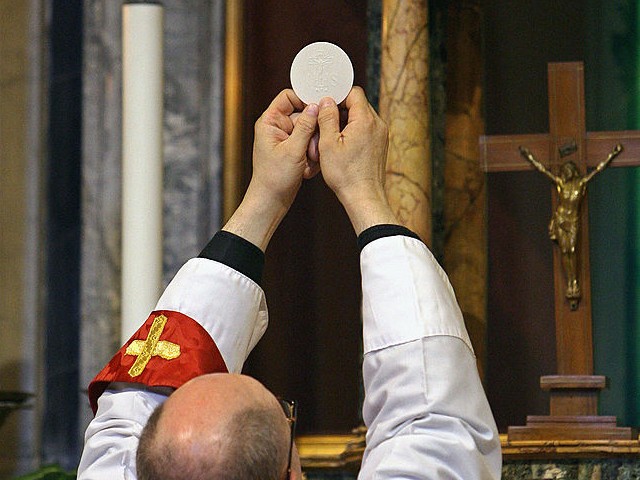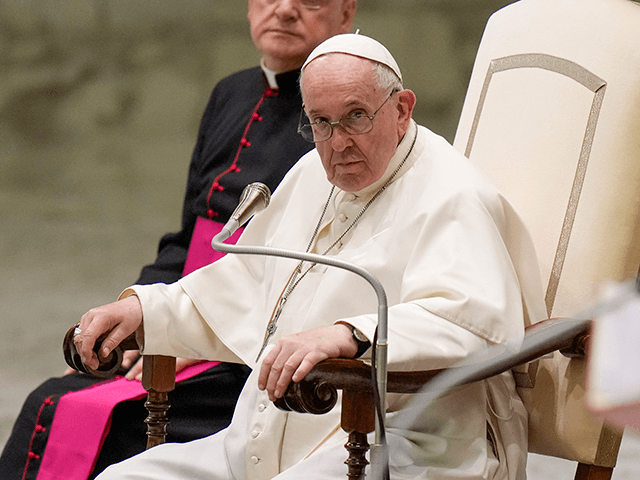ROME — Pope Francis accused those resisting his sweeping restrictions on the Traditional Latin Mass as sowers of diabolical division in the Church.
Liturgical life “must lead to greater ecclesial unity, not to division,” the pontiff told faculty and students of the Pontifical Liturgical Institute Saturday. “When liturgical life is something of a banner of division, there is the odor of the devil, the deceiver.”
“It is not possible to worship God and at the same time make the liturgy a battlefield for issues that are not essential, indeed, for outdated issues and to take a stand, starting with the liturgy, with ideologies that divide the Church,” he insisted.
Changes in the Church’s practice “scandalize closed minds,” Francis said.
“Indeed, these closed mindsets use liturgical schemes to defend their point of view,” he said, and this is “the drama we are experiencing in ecclesial groups that move away from the Church, they question the Council and the authority of the bishops to preserve the tradition.”

Monsignor Ignacio Barreiro Carambula celebrates the Latin Tridentine Mass in St. Giuseppe a Capo le Case Church in Rome, Italy, in July 2007. (ALBERTO PIZZOLI/AFP via Getty Images)
In July 2021, Francis repealed inclusive measures by his predecessors, Pope John Paul II and Pope Benedict XVI, that allowed for greater flexibility and diversity in the Catholic liturgy.
In his apostolic letter titled Traditionis Custodes (“Guardians of Tradition”), the pope banned the celebration of the Traditional Latin Mass — sometimes called the “Tridentine” Mass, in reference to the 16th-century Council of Trent — in Catholic parishes and lifted existing accommodations to priests who want to use the extraordinary form of the Catholic liturgy.
The letter reversed measures to relax restrictions on the use of the traditional form by Pope Benedict XVI, who, in 2007, noted that many of the faithful have continued to be attached with “love and affection to the earlier liturgical forms which had deeply shaped their culture and spirit.”
In recognition of this diversity, Pope John Paul II had sought greater inclusiveness by granting the faculty of using the older form and “exhorted bishops to make broad and generous use of this faculty on behalf of all the faithful who sought it,” Benedict wrote.
Benedict established that the Roman Missal promulgated by Pope Paul VI “is the ordinary expression of the lex orandi (rule of prayer) of the Catholic Church of the Latin rite,” whereas the Roman Missal promulgated by Saint Pius V “is nonetheless to be considered an extraordinary expression of the same lex orandi of the Church and duly honored for its venerable and ancient usage.”
“What earlier generations held as sacred, remains sacred and great for us too, and it cannot be all of a sudden entirely forbidden or even considered harmful,” Benedict explained. “It behooves all of us to preserve the riches which have developed in the Church’s faith and prayer, and to give them their proper place.”
For his part, Francis declared that the 1970 Roman Missal is not the “ordinary expression” but rather “the unique expression of the lex orandi of the Roman Rite” (emphasis added). The new, exclusive ruling seems to eliminate the older form of the Mass as a legitimate expression of the lex orandi of the Church, despite its venerable tradition.
Pope Benedict had granted broad faculties to Catholic priests who wished to say Masses in private using the Roman Missal published in 1962, declaring that to do so, “the priest needs no permission from the Apostolic See or from his own Ordinary.”
Pope Benedict XVI, also known as Pope Emeritus, poses for a picture at the airport in Munich, Germany, in 2020. Benedict relaxed restrictions on the use of the Traditional Latin Mass in 2007. (SVEN HOPPE/POOL/AFP via Getty Images)
According to Francis’ restrictions, priests who wish to celebrate using the Roman Missal of 1962 “should submit a formal request to the diocesan Bishop who shall consult the Apostolic See before granting this authorization.”
The Vatican’s own website declares that “according to present norms, the Latin language still holds primacy of place as that language which, based on principle, the Church prefers, even though she recognizes that the vernacular can be useful for the faithful.”
The Vatican goes on to note that “Latin should be safeguarded as a precious inheritance of the Western liturgical tradition.”
The Code of Canon Law, which governs Church activity and liturgy, similarly stipulates: “The eucharistic celebration is to be carried out in the Latin language or in another language provided that the liturgical texts have been legitimately approved.”
Saint John Paul II urged the continued use of Latin in the Church to maintain ties with its own history and traditions.
“The Roman Church has special obligations towards Latin, the splendid language of ancient Rome,” he wrote, adding that “she must manifest them whenever the occasion presents itself.”
Pope Francis justified the reversal of the more inclusive approach of his predecessors by insisting that their pastoral kindness “was exploited to widen the gaps, reinforce the divergences, and encourage disagreements that injure the Church, block her path, and expose her to the peril of division.”
The pope’s suppression of the Traditional Latin Mass was hailed by progressives and vocally opposed by conservatives, including at least three prominent cardinals.
Cardinal Gerhard Müller, for instance, the former chief of the Vatican’s doctrinal office (CDF), chided Pope Francis for his selective clampdown on the Traditional Latin Mass while allowing progressives to reject basic tenets of the faith with impunity.
Pope Francis has “drastically restricted” the celebration of the Latin Mass with the clear intent to “condemn the Extraordinary Form to extinction in the long run,” Müller observed.
By punishing the conservative peripheries, Francis “ignores the religious feelings of the (often young) participants in the Masses according to the Missal of John XXIII” without the “slightest empathy,” he wrote.
“Instead of appreciating the smell of the sheep, the shepherd here hits them hard with his crook,” Müller declared, with an allusion to one of Francis’ favorite sayings.
The formidable Cardinal Joseph Zen, the former bishop of Hong Kong, insisted that the measures were unreasonably harsh and hurt “the hearts of many good people.”
The pope’s letter “considers the very existence of a parallel rite to be an evil,” Zen declared, and reflects wishes “for the death of the [traditional] groups.”
A celebrating priest leads a Latin Mass at Rome’s ancient Pantheon Basilica in Rome, Italy, Friday, October 29, 2021. (AP Photo/Luca Bruno)
Cardinal Raymond Burke, the former head of the Vatican’s highest court, also published an essay lamenting the pope’s attack on conservative Catholics.
Those who are attached to the Traditional Latin Mass “are deeply disheartened by the severity of the discipline” imposed by Pope Francis in his letter and “offended by the language it employs to describe them, their attitudes and their conduct,” Burke wrote.
“It is apparent from the severity of the document,” Burke said, that Pope Francis issued it “to address what he perceives to be a grave evil threatening the unity of the Church.”
The pope’s message to the “devout faithful who have a deep appreciation and attachment” to the Traditional Latin Mass is that “they suffer from an aberration which can be tolerated for a time but must ultimately be eradicated,” Burke declared.
